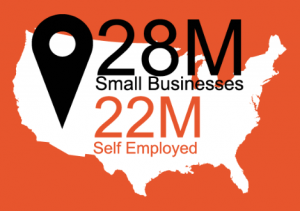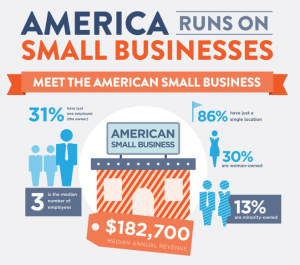Not long ago, I read an interesting article about the state of small business in the U.S. The Small Business Administration report, which you can read here, states that only about half of all new businesses survive five years or more and only about a third survive 10 years or more. With my own small business entering its third year, it was overwhelming and discouraging to think that even with our daily blood, sweat and tears, the odds are stacked three-to-one against us.
The report went on to say that 99.7 percent (28.2 million) of all companies in the U.S. are designated small businesses with 500 employees or less versus .03 percent (17,700) with over 500 employees. This made me wonder, if small businesses represent almost all companies in the country and a full two thirds fail prior to year 10, shouldn’t we all be looking for ways to beat the odds and succeed?
Since we formed initiate-it in 2011, we’ve experienced significant growth year-over-year. Even though things are going well, the stats I read made me think about growth hurdles in small businesses and how we at initiate-it are approaching business with the goal of not becoming victims of the inevitable.
Seasoned small business owners might balk at our perspective and ask, “How could these guys know anything about small business after only three years in existence?” I would answer by saying that I’ve worked in the ad agency business for over 20 years, cut my teeth at small agencies, and seen a lot of small businesses succeed and fail. I’ve also worked for larger firms as part of management contributing to company-wide strategy and decisions.
While my perspective has been shaped by the ad agency world, I think it’s applicable to small businesses in general. I hope by sharing the way we do things at initiate-it I can add to the conversation and help other small companies do business in a new – hopefully more sustainable – way.
What follows is our seven-step approach to not becoming a statistic.
1. Live and work for something or just shut the door.
It’s imperative that you have guiding principles that clients, customers and staff can buy into. Here are the guiding principles we live and work by daily:
– We listen more than we speak. It’s the only way to get fully immersed in a client’s business.
– We question everything. We must understand “why” before we can understand what needs to be accomplished.
– We work with a start-up mentality. Start-ups make success everyone’s job.
– We admit mistakes. (Come on. Are you naïve enough to think they don’t happen?) Admitting our mistakes creates transparency, cultivates creativity and builds mutual trust and respect.
2. Figure out what you do best and pursue it single-mindedly.
Know exactly what you do best and then do it with purpose and passion. If your company’s goal is to make the best coffee ever, then damn it, do that and nothing else! Want to know something I learned really quickly? When I’m honest about what initiate-it does and doesn’t do well and when I decline jobs rather than lying about our capabilities and trying to figure it out on the back end, we gain more respect, get more referrals and win more business.
3. Evolve or die.
While doing one thing better than anybody else is great, you obviously have to stay nimble and evolve with the times. Blockbuster’s a great example of a company that didn’t. Research told Blockbuster’s upper management that people actually enjoyed making a trip to the video store so it chose not offer video streaming service or DVD home delivery like its competitors. By refusing to shift its business model, Blockbuster guaranteed its own extinction.
4. Evaluate constantly.
Let’s face it. Change is scary. Fear of change is why companies fall in the trap of becoming too comfortable or set in their ways operationally. To be honest, I started initiate-it in that same mindset. “This is the way we’ve done it for years and this is the way we’re going to continue to do it for years to come.” The funny thing is, once we started questioning and evaluating our approach, our process, our partners, our vendors and our sales methods, the more we started to grow. Companies need to constantly ask, “Is this still the right way? How can we become more efficient? How else can we think about this problem or opportunity?”
5. Remember that greed is a deadly sin.
Most small businesses are in the people business. Their employees are the face of the company and play a huge role in its success or failure. One thing we’ve seen again and again in successful businesses is a staff that’s fulfilled mentally, emotionally, professionally and financially. In our three short years, we’ve made a priority of continued education and advancement, provided team members time away for charitable endeavors, given back financially to their favorite charitable organizations and provided memberships for professional and personal interests. We strongly believe that a happy and fulfilled team member will provide better and smarter results for our clients. A bitter team member, on the other hand, doesn’t help anybody.
6. Spread the wealth.
People want to be part of a winning team. It’s in our DNA. A great way to create a winning team is by rewarding your people financially with bonuses or profit sharing when your company does well. At initiate-it, we want our people to have a vested interest in the company’s success. We encourage them to go the extra mile, think outside the box and do great work for our clients. When they do, the company prospers financially and so do they. A great read on this very subject ran in The New York Times recently, with the owner of a cabinet making company detailing his profit sharing plan with specifics and dollar figures. Read it here.
7. Know when to push back and when to compromise.
How many times have you been in a meeting when one side of the table disagrees with the other? Sometimes it’s in the form of banter, sometimes in the form of a screaming match. I contend that these arguments have negative long-term effects on relationships and, ultimately, the business. To quote the late Rodney King, “Why can’t we just all get along?” Our approach is to collaborate and compromise, especially because our business is so subjective. We don’t live and die by procedures, we aren’t curing cancer and no one is going to die on our watch. So who are we to say that somebody else’s opinion is wrong? We can make some recommendations and you can agree or disagree. If you do, we’ll try it your way and see what happens. If we aren’t failing at some things we aren’t going to succeed.
If you look at successful small companies, you’ll probably see a lot of these philosophies in action. The same goes for small companies that have successfully made the leap to large companies.
Succeeding isn’t easy but we tend to make it harder than it has to be. So hire great people. Reward them when your company does well. Make them feel like they can influence their own destiny with their hard work. Seek out good partnerships. Listen more than you talk. Be smart. Treat people the way you want to be treated.
When one small business succeeds, we all succeed. Here’s to your business beating the odds and becoming everything you want it to be.
Posted by Andrew Smith, president of initiate-it, a small Richmond, Virginia-based ad agency. Andrew founded initiate-it in 2011 after spending 20 years learning the business from inside large and small agencies and in-house corporate marketing departments.



